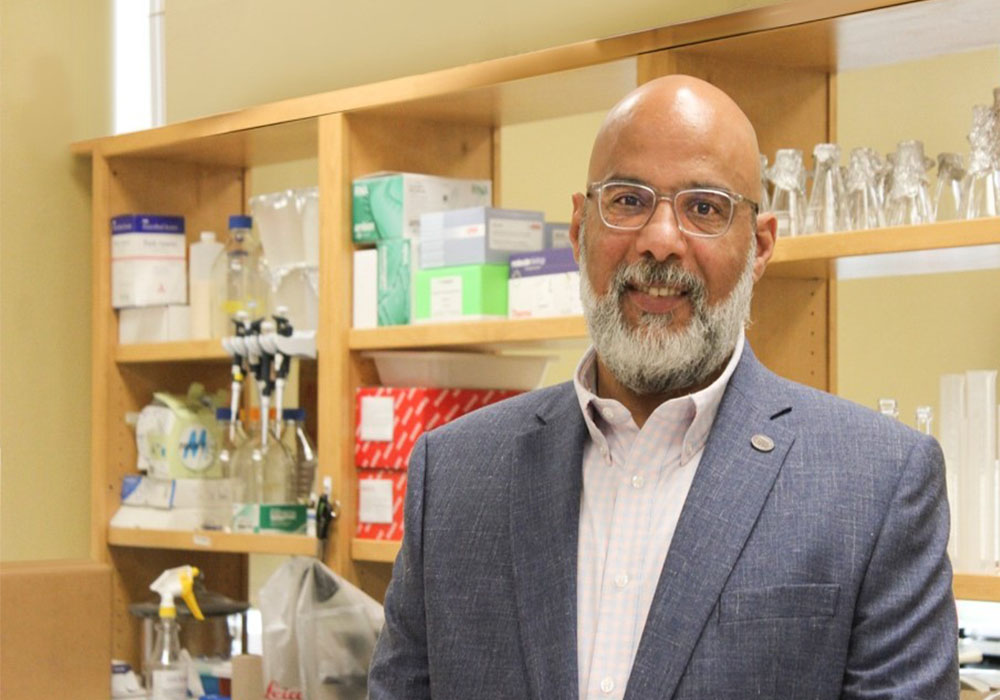Integration of fungal endophytes into crop plants to improve productivity: application and molecular mechanisms
Tue, 12 April 2022
 Abstract: A major obstacle facing 21st century innovators is to develop more environmentally friendly and sustainable agricultural
systems. Our lab discovered more than 1000 fungal endophytes from wild plants growing
under stressful environmental conditions. We focused our collections on areas impacted
by drought, high salinity, and severe nutrient deficiencies. We have tested the effects
of some of these fungal endophytes on corn and tomato growth and production under
greenhouse and field conditions. Endophytic fungi were initially tested in tomato
under greenhouse conditions. Then endophytic fungi with positive results on tomato
were then tested on corn under small field trials. Many of our fungal endophytes have
shown a positive effect on both tomato and corn production ranging from a 2% to 72%
increase in production compared to non-symbiotic plants. Some of our endophytes are
being tested in large-scale field trials by our industry partners. In addition, we
continue to discover and conduct initial testing of novel beneficial endophytes in
both corn and tomato.
Abstract: A major obstacle facing 21st century innovators is to develop more environmentally friendly and sustainable agricultural
systems. Our lab discovered more than 1000 fungal endophytes from wild plants growing
under stressful environmental conditions. We focused our collections on areas impacted
by drought, high salinity, and severe nutrient deficiencies. We have tested the effects
of some of these fungal endophytes on corn and tomato growth and production under
greenhouse and field conditions. Endophytic fungi were initially tested in tomato
under greenhouse conditions. Then endophytic fungi with positive results on tomato
were then tested on corn under small field trials. Many of our fungal endophytes have
shown a positive effect on both tomato and corn production ranging from a 2% to 72%
increase in production compared to non-symbiotic plants. Some of our endophytes are
being tested in large-scale field trials by our industry partners. In addition, we
continue to discover and conduct initial testing of novel beneficial endophytes in
both corn and tomato.
Moreover, our lab is studying the molecular mechanisms that govern the symbiotic relationships between the fungus Curvularia protuberata carrying a dsRNA virus named Curvularia thermal tolerance virus(CThTV) and plants leading to its survival of soil temperatures up to 65 oC. The fungus carrying the virus not only provides tolerance to native plant, but also to crop plants including tomato, corn, rice, wheat, and watermelon. Loss of the CThTV abolishes the ability of both the plant and the fungus to survive extreme heat stress, indicating involvement of the virus in this relationship. In this three-way symbiosis involving a plant, a fungus and a virus, none of the partners survives soil temperatures above 38 °C in isolation. Metabolic comparisons between C. protuberata carrying the CThTV with the virus-free fungus growing in culture showed that the presence of CThTV leads to alteration of key fungal metabolic components including melanin and trehalose. Metabolic and microarray data using the tomato as a model system suggest that fungal trehalose and melanin levels change during plant heat stress. We propose a model in which C. protuberata carrying the CThTV confers thermotolerance in plants via production of large quantities of trehalose, some of which seeps into surrounding plant tissues to function as a stress signalling molecule. Trehalose signalling will regulate plant biochemical processes, particularly carbon utilization and cell division during stress.
Speaker introduction: Mustafa Morsy is a biology professor in the Department of Biological and Environmental Science at the University of West Alabama (UWA). He earned a Ph.D. in Cell and Molecular Biology from the University of Arkansas. He completed postdoctoral training at the University of Nevada, Reno, and the Noble Institute in, Ardmore, Ok. In 2011, he joined the University of West Alabama as a full-time faculty and has been there since then. He was granted tenure in 2015 and a full professor in 2020.
Dr. Morsy s lab aims to develop more environmentally friendly and sustainable agricultural systems. There are two themes in Morsy s laboratory: 1) A basic science project focused on characterizingthe molecular mechanisms that govern a three-way symbiosis between a plant, a fungus, and a virus, which leads to plant extreme heat tolerance. 2) An applied project that focuses on discovering fungal endophytes associated with environmental stress tolerance and using them in crop plants funded by five different United States Department of Agriculture, Specialty Crop Block Grants, and some industry partners. In the past 10 years, Morsy has obtained >$5 million from different funding agencies to support his research. Morsy s lab research uses various tools included physiological, genomic, proteomic, and metabolomic methods.
Seminar details
- Date and time: March 17, 2022 @ 13 PM
- Zoom link
- https://uaeu-ac-ae.zoom.us/j/89798759484?pwd=czJ1dVdlSWtrS29CVGhmSW9IRnZGdz09
- Meeting ID: 897 9875 9484 Password: 482660
Do you find this content helpful?
عفوا
لايوجد محتوى عربي لهذه الصفحة
عفوا
يوجد مشكلة في الصفحة التي تحاول الوصول إليها

